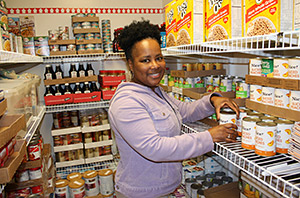Let food be thy medicine
"Let food be thy medicine and medicine be thy food."
– attributed to Hippocrates, sometimes referred to as the "Father of Medicine"
 Whether or not Hippocrates actually said this is up for debate; what’s not up for debate is the positive effects access to food has had on patients at the Hopple Street Neighborhood Health Center.
Whether or not Hippocrates actually said this is up for debate; what’s not up for debate is the positive effects access to food has had on patients at the Hopple Street Neighborhood Health Center.
Since July 2017, the Rubber Duck Family (Food as Medicine in Low Income Youth) Market has operated out of the clinic. The market was the brainchild of Hopple’s social worker, Stephanie Coffey, who felt the burden of food insecurity in Hopple’s patients. Though they came for medical care, the other factors in their lives could not be ignored.
“It made us feel helpless to know that our patients struggled due to a lack of nutritious food. Not being able to help in a meaningful manner was frustrating and heartbreaking,” said Mary Carol Burkhardt, MD, medical director, Hopple Street.
With the help of the Bob Edwards Feed a Child Fund and the Freestore Foodbank, the Rubber Duck Family Market was started.
“We had already worked with the Freestore to make formula available,” said Burkhardt. “But we took this even further by adding in items such as pasta, soups, chili, peanut butter, cereal, etc., in addition to formula and diapers.”
Besides being located in a food desert – an area where affordable and nutritious food is difficult to obtain – the neighborhood has high unemployment and infant mortality. A large percentage of the patients who come to the clinic seek help for social issues, such as malnourishment, domestic violence, abuse or neglect in addition to medical conditions.
Patients are asked to complete a questionnaire that includes questions about food insecurity. Since it can be awkward for patients to admit to food insecurity, the questionnaire provides an entry into all issues facing patients. Food issues are discussed and access to the Rubber Duck Market is offered.
Breaking down the barrier of food insecurity leads to trust in identifying other issues that are interfering with their health.
“When they trust us with an issue like food, they are more willing to talk about other things impacting their health and their lives,” said Burkhardt. “We learn so much more about them, their environment and their family. In fact, it’s been a great way to learn about health issues facing other members of a household too.” This has resulted in uncovering issues that Hopple Street can help with – connecting them to more sustainable food sources and benefits or help from other organizations in the area.
In addition to the Rubber Duck Market, free, fresh produce is provided by the Freestore Foodbank and is given out to families every other week.
What do patients think about the pantry? Here are a few quotes that show the difference the pantry is making:
- “It opened the door. I now feel more comfortable asking for help if I find myself in a situation where I need assistance. I know you all will do your best to help my family.”
- “The food held us over until my food stamps came one week later. It was the right amount at the right time!”
- “I was able to focus on other necessities -- clothing and diapers.”
The Rubber Duck Family Market is the one of the first of its kind in the United States to be located within a medical facility. Cincinnati Children’s is considering the possibility of implementing similar facilities in other clinics.



